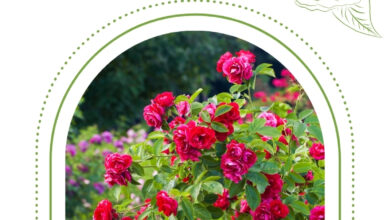10 Beautiful Window Box Ideas For Flowers And Edibles
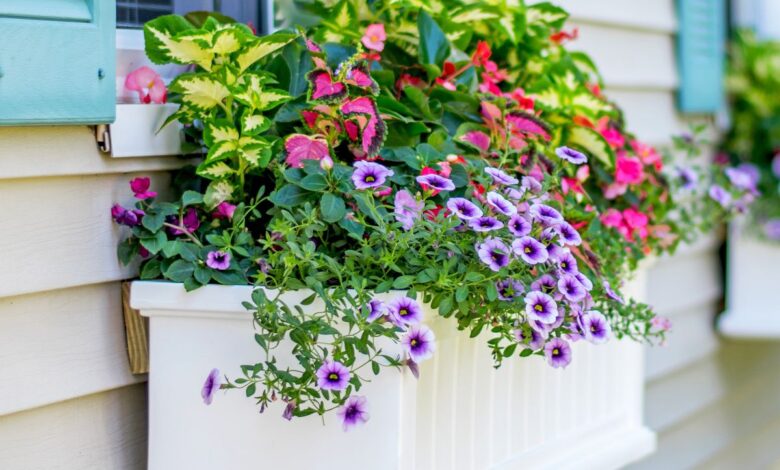
[ad_1]
Window boxes offer the most versatile planting opportunities, yet are so often overlooked. Not only do these charming planters add impact to a home’s exterior, but they create a more pleasant outlook, providing a hint of nature and fragrance.
Even homes with no outdoor space can benefit from these beautiful window box ideas, making them an ideal solution for apartment living.
Consider how much light the window receives, as it will dictate what you can plant. South-facing windows are likely to require sun-loving window box plants. They also need more attention when it comes to watering window boxes.
You should also be guided by your USDA hardiness zone – unless you plan to plant annuals or can protect the boxes over a harsh winter.
As well as seasonal flowers, edible window boxes provide an appealing solution to growing vegetables, herbs, and fruits.
These window box ideas can be adapted to suit a wide variety of home styles.
1. Go All White With Daisies
(Image credit: Getty Images)
If you have a white house exterior, a window box planted with simple white daisies is pure perfection.
Rather than the common wildflower, opt for shasta daisies, which are perennial flowers that bloom abundantly all summer long.
They grow well in containers, as long as you keep them well watered in dry weather. Ideally, shasta daisies prefer full sun, but they will tolerate partial shade.
Other white daisy-like flowers to consider for window boxes are chamomile, zinnia ‘Profusion White’, and Mexican daisy (Erigeron karvinskianus) – although check it isn’t considered invasive in your area.
2. Add Warmth With Bold Sunshine Hues
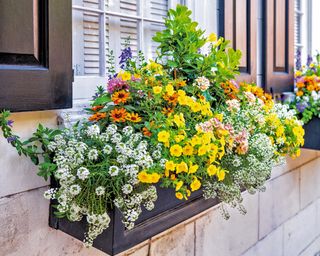
(Image credit: Shutterstock)
A palette of warm yellows and oranges will add a pop of sunshine to your window box display.
Here, orange zinnias and yellow calibrachoa sing out against a neutral foil of sweet alyssum. Similar sunny flowers to try include false sunflowers, black-eyed Susan, and Allamanda cathartica.
Pink and purple hints from lantana, angelonia, and pentas provide a bold contrast.
3. Make It Low-Maintenance With Succulents
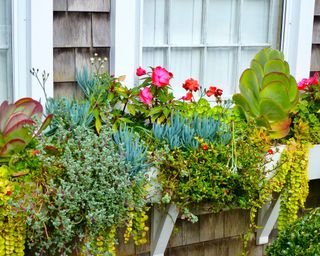
(Image credit: Shutterstock)
While window boxes are traditionally thought of as a showcase for flowers, succulents provide a vibrant, inviting display.
Opt for a mix of upright, flowering, and trailing varieties to capture the “thriller, filler, spiller” principle. Choose slow-growing varieties, and you can pack them in quite closely.
While succulents are low-maintenance, they prefer a sunny spot and will require watering in dry periods. Ensure the potting mix is a free-draining medium suitable for succulents.
4. Display Pots In An Ornamental Iron Window Box
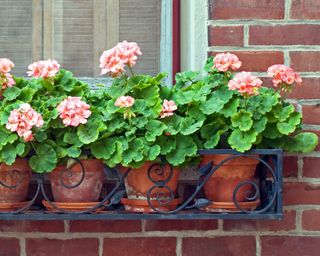
(Image credit: Shutterstock)
An ornamental iron window box is perfect for displaying smaller potted plants. This design allows the rustic terracotta pots to be on show, adding a vintage touch.
It’s also a highly versatile design, as individual pots can easily be swapped out to refresh the display.
Romantic double-flowered pelargoniums – also known as scented geraniums – are a beautiful planting choice, lending old-fashioned charm to a traditional home.
5. Plant A Mini Herb Garden
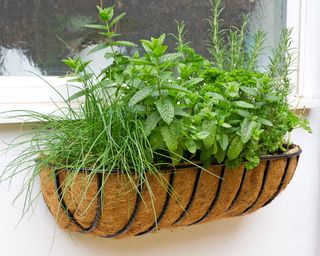
(Image credit: Alamy)
Planting a window box with herbs is both a beautiful and practical solution where space is at a premium.
Growing herbs at your kitchen window will provide easy access for snipping, and adds an inviting aroma.
Flowering herbs will also be a draw for beneficial pollinating insects, helping to promote biodiversity.
For the best results, the window should receive at least 6 hours of direct sunlight each day.
Suitable herbs to grow in window boxes include basil, chives, cilantro, mint, oregano, parsley, rosemary, sage, tarragon, and thyme.
6. Make A Maximalist Jewel-Box Display
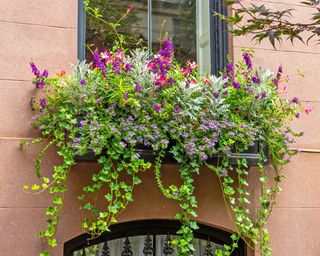
(Image credit: Alamy)
This stunning window box is bursting with rich jewel-box colors provided by purple angelonia and fan flower (scaevola), and pink mandevilla flowers.
Dusty miller and English ivy provide a mix of upright and trailing foliage, adding both structure and softness to the display.
Weight is a key consideration when planting up an abundant window box, so ensure the total weight with soil and plants does not exceed the maximum recommended weight for the box and fixings.
Regular watering will also be necessary, so ensure it is in an accessible location.
7. Plant A Fragrant Lavender Box
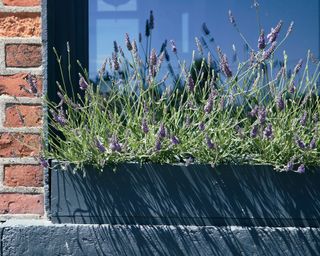
(Image credit: Philip Lauterbach)
Planting up a window box with only lavender is one of the most simple yet effective window box ideas. It makes a stunning contrast with a modern industrial-style window design.
Lavender is perhaps the most delicious of all plant fragrances, with both the flowers and foliage emitting an inviting scent.
The low-maintenance shrubs are magnets for bees and butterflies, and the flowers are also edible.
Dwarf varieties of lavender are best for window boxes, as they will require less effort keeping to a manageable size. English lavender copes better with a cold winter than French or Spanish varieties.
8. Grow Cut-And-Come-Again Greens
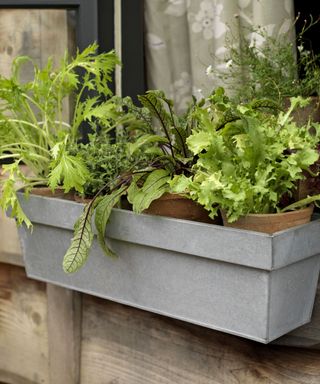
(Image credit: Future Content Hub)
Leafy greens are very compatible with window boxes, especially when grown as cut-and-come again or baby leaves, which take up less space.
Lettuce is a thirsty plant, so keep on top of watering, but ensure the planter has plenty of drainage, as it dislikes sitting in soggy soil.
While slugs and snails are less likely to bother your lettuce crops positioned up high, insects may still be an issue, so consider companion planting with herbs or marigolds, and use insecticidal soap if pests become problematic.
9. Add Romance With Trailing Flowers
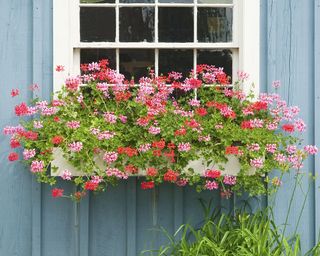
(Image credit: Shutterstock)
Allowing trailing flowers, such as ivy geraniums, to spill out over the side of window boxes makes an impactful romantic display. It’s also a good way to disguise plain, inexpensive containers.
Other great trailing flower options include lobelia, fuchsia, and begonia.
10. Herald Spring With A Colorful Bulb Display
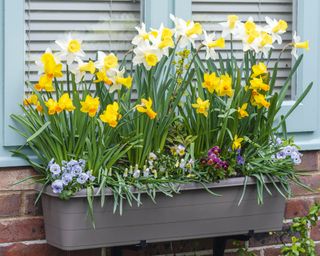
(Image credit: Future Content Hub)
Plant spring-flowering bulbs in window boxes in the fall for a spectacular display that will shake off the winter blues.
Here, daffodils Narcissus ‘Jetfire’, Narcissus ‘Smiling Sun’, and Muscari ‘Siberian Tiger’, are interspersed with winter-flowering violas and euphorbia.
Spring bulbs in window boxes should be planted closely together using the layered, lasagne style of planting, for maximum impact and to ensure the longevity of the display.
[ad_2]
Source link




